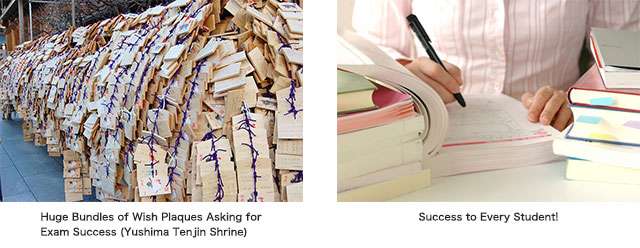News
January - Juken: Screening Exam Season Updated in January 2019
Winter months after the new year are the most crucial time of the academic year for “juken-sei” or students preparing for upcoming screening exams. The term juken-sei usually refer to 15-year-olds (grade 9) going for high school screening or 18-year-olds (grade 12) and up going for university as Japan adopts the 6-3-3 education system.
Although there are self-taught juken-sei studying on their own, many students enroll in an after-school preparatory “juku” or cram-schools to nail their weak subjects. Because the number of students are decreasing due to Japan’s aging society, the education industry is facing fierce competition to lure students and parents with tailor-made learning systems, summer/winter break courses, celebrity-lecturers and more. One traditional staple service, is the national mock trial exams called “moshi” (short for mogi-shiken) which may be taken every few months before the real exam. When you specify university or faculty names, the moshi result will analyze your strengths and weaknesses and lets you know your probability of getting accepted. It is not uncommon to switch to a different juku when the moshi results are not satisfactory.

Many people in education are concerned about the looming university admissions reform to start in academic year 2020 or the screening test of January 2021. Primarily, the current National Center University Entrance Examination(NCUEE or commonly known as Center-Shiken) will change to a new screening system called Daigaku Nyugaku Kyotsu Test to include questions requiring written answers for Math and Kokugo (Japanese Language). To catch up with this reform, high school curriculum will emphasize students’ thinking process and abilities to express themselves as opposed to traditional fact-learning. There could be additional reforms.
Another heated issue is whether juken-sei would immediately be obliged to submit private English testing scores (e.g. Cambridge English Certification, Eiken, GTEC, TELTS, TEAP, TOEFL iBT and TOEIC L&R/S&W) as part of the official admissions process. Until the academic year 2024 (test of Jan 2023), universities have the freedom to adopt private English testing services or to use the English Test provided by the Daigaku Nyugaku Kyotsu-Test in addition to their original English (Eigo) exam. From academic year 2025 (test of Jan 2014) onwards however, the English portion of the Kyotsu-Test is scheduled be completely replaced by the privately-run English aptitude tests listed above. Between now and 2023, there is a transition period to maintain fairness to students with less opportunity to take such private certification tests. Students in rural areas for instance, have limited access to test sites and are burdened to pay for long commutes to the test site. The government is trying increase test sites to counter this issue. So far, Tohoku University, University of Tokyo, Nagoya University and Kyoto University announced that they will not oblige juken-sei to submit private English test scores under the new test in January 2021.







